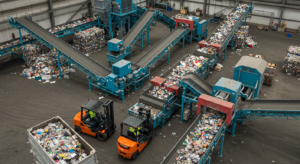Starting a trash recycling business requires more than just a desire to make a positive impact on the environment. It demands the right tools and equipment to ensure the process runs smoothly, efficiently, and safely. From breaking down materials to sorting and transporting recyclables, each step of the recycling process depends on the proper machinery. Whether you’re launching a new venture or upgrading your current operations, this guide will walk you through the ten most essential tools and equipment for a successful trash recycling business.
Industrial Shredder
An industrial shredder is the heart of most recycling facilities. It breaks down large volumes of waste materials into smaller, manageable pieces. These machines can handle various materials including plastic, metal, cardboard, and electronic waste. Choosing the right shredder, whether single-shaft or double-shaft, depends on the types of materials you’ll be processing. Industrial shredders not only make transportation and sorting easier but also significantly reduce the volume of waste, improving overall efficiency.
Baler Machine

Balers are crucial for compacting recyclable materials into dense, easy-to-transport bales. They play a vital role in streamlining storage and logistics. Vertical balers are ideal for small-scale operations while horizontal balers are designed for larger facilities with high volumes of recyclables. By using a baler, businesses can save on storage space, reduce labor costs, and improve the resale value of processed materials. Investing in balers will ensure your trash removal services are more organized and efficient.
Conveyor Belts
A recycling facility without a conveyor system would experience delays and inefficiencies. Conveyor belts transport materials from one processing station to another, ensuring a smooth and consistent workflow. They come in different designs and lengths, and can be customized to fit the layout of your facility. Investing in durable, automated conveyor systems minimizes manual handling and speeds up sorting and processing times.
Sorting Station
Efficient sorting is a cornerstone of effective recycling. A sorting station allows for manual or semi-automated separation of materials based on type and quality. A well-designed sorting table improves worker comfort and safety while ensuring accuracy in separating paper, plastics, metals, and other recyclables. Modular setups can be scaled as the business grows, making them a versatile solution for new and expanding operations.
Magnetic Separator
Metal contamination can cause damage to processing equipment and lower the quality of recyclables. A magnetic separator is used to extract ferrous metals such as iron and steel from mixed waste streams. This ensures cleaner output, reduces equipment maintenance costs, and helps meet recycling standards. Integrating magnetic separation early in the process streamlines downstream activities and improves material recovery rates.
Eddy Current Separator
While magnetic separators handle ferrous metals, eddy current separators focus on non-ferrous metals like aluminum and copper. This advanced technology uses magnetic fields to separate metals from non-metallic materials without any physical contact. The result is a highly efficient system that boosts metal recovery rates and enhances the value of the processed output. Investing in this equipment is essential for facilities dealing with complex or high-value waste streams.
Air Separator
Light materials such as paper, plastic films, and foams can be challenging to separate efficiently. Air separators use controlled airflows to divide materials based on their weight and density. This technology helps improve sorting accuracy and throughput without excessive manual intervention. Air separators are especially useful in facilities that handle mixed waste or require high-speed processing.
Forklift or Skid Steer Loader
Material handling equipment like forklifts and skid steer loaders is indispensable in any recycling operation. They facilitate the quick movement of heavy materials, large bins, and compacted bales across the facility. Choosing the right machine depends on the size of the facility and the type of materials being handled. Attachments such as clamps and grapples can further enhance their functionality. Regular maintenance and proper training are key to ensuring safe and efficient operation.
Dust Suppression System
Recycling processes often generate large amounts of dust, which can be hazardous to workers and pose a risk of fire. A dust suppression system helps maintain air quality, reduce health risks, and comply with environmental safety regulations. Whether it’s a misting system or a localized vacuum setup, controlling airborne particles is critical to maintaining a safe and productive work environment.
Weighing Scales and Load Cells
Accurate measurement is essential for inventory tracking, billing, and regulatory compliance. Weighing scales and load cells provide precise data on the weight of incoming and outgoing materials. Digital systems can be integrated with your business software to automate data collection and reporting. This equipment not only supports operational transparency but also helps identify inefficiencies and reduce waste.
Conclusion
Equipping your recycling business with the right tools is a critical step toward achieving operational excellence, sustainability, and profitability. Each piece of equipment mentioned above plays a specific role in enhancing efficiency, ensuring safety, and increasing the quality of recyclable output. As the demand for recycling services continues to grow, staying competitive means investing in reliable, high-performance tools that streamline every aspect of your operation.